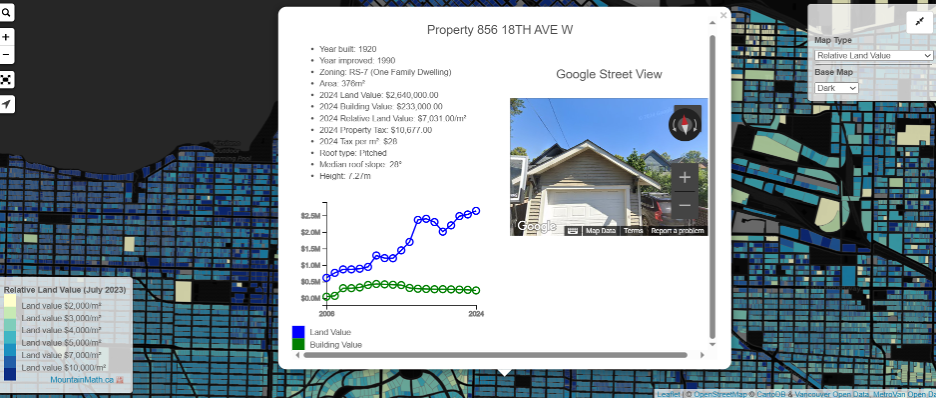"Governments should not bail out speculative housing development models, but instead use this moment to invest in non-market housing, preserve existing affordability, and ensure that public subsidies serve long-term public outcomes." - From an Open Letter to Prime Minister Mark Carney, featured in the Vancouver Sun.
In a sharply worded response to The Atlantic’s recent piece The Biggest Myth About the YIMBY Movement, Patrick Condon—James Taylor Chair in Landscape and Livable Environments at the University of British Columbia—in this op-ed published by TPR rebukes what he calls the magazine’s “housing propaganda” and urges a more evidence-based debate on affordability. Condon cites new research from the National Bureau of Economic Research (NBER) to argue that zoning restrictions play only a minor role in rising prices, and that land speculation—not housing scarcity—is the real culprit behind unaffordability in global cities. Rather than fueling a speculative land market through deregulation, Condon contends, cities must leverage tools like public land trusts and inclusionary zoning to ensure growth serves the public good. We also share the open letter from 27 well-known Metro Vancouver scholars, retired city planners, urbanists, developers and architects sent to Prime Minister Carney and Housing Minister Gregor Robertson, shared by Condon.

"Instead of deregulating blindly, cities should demand affordability in exchange for upzoning—through inclusionary zoning, public land trusts, or density bonuses tied to permanently affordable housing." - Patrick Condon
Increasing housing density alone is insufficient to produce affordability, say the experts. “Without addressing land value inflation, financial speculation and tenure security, supply-side interventions risk worsening the very crisis they aim to solve.” - From the Open Letter
It’s disappointing—no, infuriating—that The Atlantic, a publication once known for rigorous journalism, continues to give space to writers who show little regard for evidence when it comes to housing. The latest example, The Biggest Myth About the YIMBY Movement by Ron Davis, repeats a well-worn but deeply flawed narrative: that “NIMBYs” are to blame for rising housing costs because they restrict supply through local opposition to density.
Davis makes this claim repeatedly without offering a shred of serious empirical evidence. That’s because the evidence doesn’t support him.
The most decisive refutation comes from a March 2025 study published by the National Bureau of Economic Research (NBER), a widely respected, nonpartisan think tank. In Supply Constraints Do Not Explain House Price and Quantity Growth, the researchers examined hundreds of U.S. cities—in both “red” states with lax zoning and “blue” states with tighter controls. Their conclusion? Supply constraints play only a very minor role in rising home prices.
Their words, not mine:
“These results challenge the prevailing view of local housing and labor markets and suggest that easing housing supply constraints may not yield the anticipated improvements in housing affordability.”
So why does this myth persist?
Because it sounds logical. If you restrict supply, prices rise. But what this logic misses are that housing prices haven’t just gone up—they’ve exploded, globally. And not because of restrictive zoning. In major cities like San Francisco, London, Sydney, and yes, Vancouver—where I live—the value of land has vastly outpaced the value of the structures on it. The dirt is what costs the most, not the home.
In Vancouver, the land under a modest bungalow can be worth ten times the house itself. And adding more homes to that parcel—"densifying"—just increases the land’s speculative value, driving prices higher, not lower.
This isn’t a housing market. It’s a land market on fire.
Relaxing zoning in this context doesn’t solve the crisis. It fuels it. It gives away land value to speculators while asking nothing in return. Instead of deregulating blindly, cities should demand affordability in exchange for upzoning—through inclusionary zoning, public land trusts, or density bonuses tied to permanently affordable housing.
In Broken City, I argue that cities have tools to ensure growth benefits the many, not just the few. Let’s use them. But first, let’s stop spreading myths.
Sincerely,
Patrick M. Condon
Chair, James Taylor Chair in Landscape and Livable Environments
University of British Columbia
Figure 1. Typical example of land price separating wildly from home price in Vancouver.
-
The open letter from 27 well-known Metro Vancouver scholars, retired city planners, urbanists, developers and architects sent to Prime Minister Carney and Housing Minister Gregor Robertson: Available Here
Recommendations from the group of experts, some of which go against the desires of developers:
1. “Do not use public funds to bail out over-leveraged speculative developments.”
2. Avoid tearing down existing rental buildings, to replace them with more expensive dwellings. “Preserve existing affordability, and build new homes that serve real people, not just markets.”
3. Return to policies of “growth pays for growth.” Governments should again demand developers provide significant infrastructure and amenities in exchange for construction approvals. “The costs of growth should not be downloaded to municipalities, ie. local taxpayers.”
4. Prioritize federal funds and grants for co-ops, land trusts and non-profit housing.
- Log in to post comments




